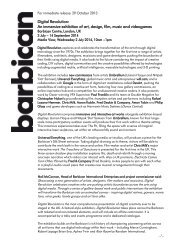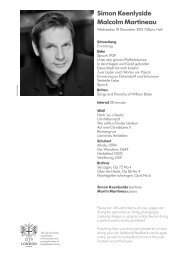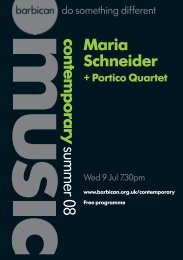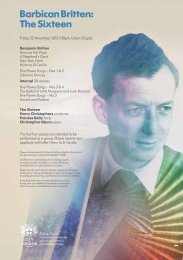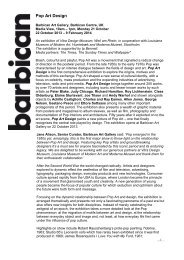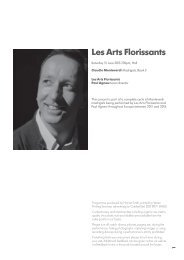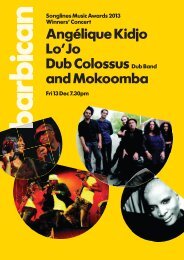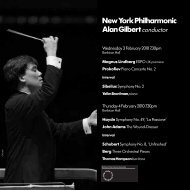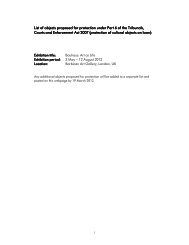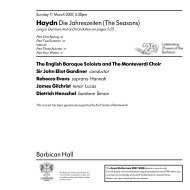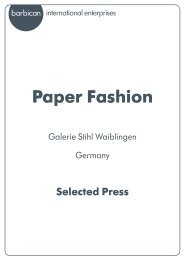Download your concert programme here - Barbican
Download your concert programme here - Barbican
Download your concert programme here - Barbican
Create successful ePaper yourself
Turn your PDF publications into a flip-book with our unique Google optimized e-Paper software.
1<br />
Renée Fleming<br />
Sunday 9 December 2012 3.00pm<br />
<strong>Barbican</strong> Hall<br />
Hugo Wolf<br />
Goethe Lieder<br />
Frühling übers Jahr; Gleich und gleich; Die Spröde;<br />
Die Bekehrte; Anakreons Grab<br />
Gustav Mahler<br />
Rückert-Lieder<br />
Ich atmet‘ einen linden Duft!; Liebst du um Schönheit;<br />
Um Mitternacht; Blicke mir nicht in die Lieder; Ich bin der Welt<br />
abhanden gekommen<br />
Interval: 20 minutes<br />
Arnold Schoenberg<br />
Erwartung, Op. 2 No. 1; Jane Grey, Op. 12 No. 1<br />
Andrew Eccles/Decca<br />
Alexander von Zemlinsky<br />
Fünf Lieder auf Texte von Richard Dehmel<br />
Vorspiel; Ansturm; Letzte Bitte; Stromüber; Auf See<br />
Erich Korngold<br />
Sterbelied, Op. 14 No. 1; Das Heldengrab am Pruth, Op. 9<br />
No. 5; Was du mir bist, Op. 22 No. 1; Das eilende Bachlein,<br />
Op. 27 No. 2<br />
Erich Korngold, after Johann Strauss II<br />
Walzer aus Wien – Frag mich oft<br />
Renée Fleming soprano<br />
Maciej Pikulski piano<br />
Programme produced by Harriet Smith; printed by Vertec<br />
Printing Services; advertising by Cabbell (tel. 020 8971 8450)<br />
Confectionery and merchandise including organic ice cream,<br />
quality chocolate, nuts and nibbles are available from the<br />
sales points in our foyers.<br />
Please turn off watch alarms, phones, pagers, etc. during the<br />
performance. Taking photographs, capturing images or using<br />
recording devices during a performance is strictly prohibited.<br />
If anything limits <strong>your</strong> enjoyment please let us know during<br />
<strong>your</strong> visit. Additional feedback can be given online, as well as<br />
via feedback forms or the pods located around the foyers.
Vienna: the window to modernity<br />
Frequently, recitals cover whole<br />
centuries of musical history, the<br />
scale ranging from Mozart to<br />
late Romanticism. The singer not<br />
only wants to offer variety to his<br />
or her audience, but also wants<br />
to meet the challenge of coping<br />
with different musical ages,<br />
styles, authors and languages.<br />
In my current <strong>programme</strong> I<br />
concentrate on a comparatively<br />
short period: T<strong>here</strong> are only<br />
45 years between the Goethe<br />
Songs by Hugo Wolf and Erich<br />
Korngold’s ‘Das Eilende Bächlein’.<br />
But how very much happened in<br />
those few years between 1888 and<br />
1933, between the golden age of<br />
the German and Austro-Hungarian<br />
monarchies and the beginning<br />
of the Third Reich – not only in<br />
world history but also in the field of<br />
culture: Fin de siècle, Art nouveau<br />
and Expressionism, psychoanalysis<br />
and the women’s movement; the<br />
invention of the gramophone<br />
record, film, broadcasting;<br />
the boom of operetta and<br />
the cabaret; the Bauhaus and<br />
New Music movements.<br />
From a musical point of view, it<br />
was one of the richest and most<br />
exciting epochs in history, and<br />
one of the most important creative<br />
centres of those years was Vienna.<br />
It was in Vienna that many key<br />
developments and encounters<br />
took place – not to mention all<br />
the musical circles and salons,<br />
very often led by emancipated<br />
women, w<strong>here</strong> artists met<br />
and inspired one another.<br />
As a representation of the<br />
enormous artistic variety that<br />
originates from those years, today<br />
I would like to present to you<br />
works of five composers of that<br />
epoch whose tracks were closely<br />
linked. Hugo Wolf and Gustav<br />
Mahler, both born in 1860, joined<br />
the class of Robert Fuchs at the<br />
Vienna Academy of Music, but<br />
developed in highly different ways.<br />
Mahler supported the Wunderkind<br />
Erich Korngold and advised<br />
him to study with Alexander<br />
von Zemlinsky. Zemlinsky and<br />
Mahler, in turn, were connected<br />
through Alma Schindler. She had<br />
a roaring affair with Zemlinsky<br />
before marrying Mahler.<br />
Zemlinsky not only supported<br />
Korngold, but in a unique way<br />
also fostered Arnold Schoenberg.<br />
Later Zemlinsky’s sister Mathilde<br />
became Schoenberg’s wife. The<br />
influence of Mahler’s symphonic<br />
works on Schoenberg’s oeuvre<br />
and his 12-tone technique should<br />
not be underestimated. The<br />
deeper one immerses oneself<br />
in that musical epoch, the more<br />
fascinating it becomes.<br />
For me, working on these<br />
musical works was a wonderful<br />
personal journey, not least<br />
because I was shown what<br />
Vienna had been in those years:<br />
the window to modernity.<br />
Renée Fleming<br />
<strong>Barbican</strong> Classical Music Podcasts<br />
Prior to her recital at the <strong>Barbican</strong>,<br />
Renée Fleming talks exclusively to us,<br />
revealing the fascinating personal and<br />
musical links between the composers<br />
she will be performing.<br />
Subscribe to our podcast now for more exclusive interviews<br />
with some of the world’s greatest classical artists.<br />
Available on iTunes, Soundcloud and the <strong>Barbican</strong> website.<br />
2
Hugo Wolf (1860–1903)<br />
Goethe Lieder –<br />
Frühling übers Jahr<br />
Gleich und gleich<br />
Die Spröde<br />
Die Bekehrte<br />
Anakreons Grab<br />
After his youthful outpouring of<br />
songs between 1878 and 1883,<br />
Hugo Wolf experienced long<br />
bouts of creative torpor. These<br />
were the years when he earned his<br />
living primarily as Vienna’s most<br />
barbed music critic, indulging,<br />
inter alia, in his fanatical hatred<br />
of Brahms’s music. It was only in<br />
February 1888 that the floodgates<br />
opened. As Wolf wryly put it:<br />
‘Eventually, after much groping<br />
around, the button came undone.’<br />
The upshot was the 53 songs of<br />
the Mörike Songbook, composed<br />
in two torrential bursts that year.<br />
A letter to his friend Edmund<br />
Lang gives an idea of the manicdepressive<br />
Wolf’s state of mind.<br />
I have just written down a<br />
new song, a divine song, I<br />
tell you … I feel my cheeks<br />
glow like molten iron with<br />
excitement, and this state of pure<br />
inspiration is to me exquisite<br />
torment, not pure happiness.<br />
Even before he had penned his<br />
final Mörike song Wolf was pitting<br />
himself against the greatest and<br />
most universal of the German<br />
poets, Johann Wolfgang von<br />
Goethe. In another surge of<br />
euphoric creativity, he composed<br />
the 51 songs that make up his<br />
Goethe Songbook between<br />
October 1888 and February 1889.<br />
As with the Mörike Songbook,<br />
Wolf arranged the Goethe songs<br />
in thematic groups, beginning<br />
with the Harper and Mignon<br />
songs from Wilhelm Meisters<br />
Lehrjahre (and thus challenging the<br />
settings of Beethoven, Schubert,<br />
Schumann et al) and ending<br />
with the great philosophical<br />
trinity, ‘Prometheus’, ‘Ganymed’<br />
and ‘Grenzen der Menschheit’,<br />
likewise set by Schubert.<br />
The Goethe Songbook also<br />
includes a group of lyrics that the<br />
poet deemed especially suitable<br />
for singing, four of which Renée<br />
Fleming includes in her recital.<br />
Two are flower-songs of exquisite<br />
delicacy: ‘Frühling übers Jahr’,<br />
whose chiming, shimmering moto<br />
perpetuo accompaniment was<br />
surely inspired by Goethe’s image<br />
of the swaying snowdrop bells;<br />
and the tiny, diaphanous ‘Gleich<br />
und gleich’. ‘Die Spröde’ and ‘Die<br />
Bekehrte’ are piquant settings of<br />
a pair of Goethe poems in the<br />
rococo pastoral convention, the<br />
first blithely coquettish, the second<br />
rueful, with the piano evoking both<br />
the faithless Damon’s flute and<br />
rustic musette drones. The finest of<br />
these Goethe songs, both as poetry<br />
and as music, is ‘Anakreons Grab’,<br />
a tender, tranquil meditation<br />
on the Greek poet traditionally<br />
associated with the beauties of<br />
nature, the delights of the grape,<br />
love and song. As so often, Wolf’s<br />
keyboard writing <strong>here</strong> suggests<br />
the textures of a string quartet.<br />
Gustav Mahler<br />
(1860–1911)<br />
Rückert-Lieder –<br />
Ich atmet’ einen linden Duft!<br />
Liebst du um Schönheit<br />
Um Mitternacht<br />
Blicke mir nicht in die Lieder<br />
Ich bin der Welt<br />
abhanden gekommen<br />
As Mörike was to Wolf, and Heine<br />
to Schumann, so Friedrich Rückert<br />
(1788–1866) – poet, philologist,<br />
orientalist – was to Mahler. The<br />
composer identified profoundly<br />
with the mingled directness and<br />
refined sensibility of his verses,<br />
declaring that ‘after Des Knaben<br />
Wunderhorn I could not compose<br />
anything but Rückert – this is lyric<br />
poetry from the source, all else is<br />
lyric poetry of a derivative kind’.<br />
Apart from the earliest, ‘Um<br />
Mitternacht’, all of the so-called<br />
Rückert-Lieder were written in the<br />
idyllic lakeside setting of Maiernigg<br />
in Carinthia, w<strong>here</strong> Mahler had<br />
built a summer villa as a refuge<br />
from the habitual turbulence of<br />
the Viennese opera season. Four<br />
of the songs were completed, in<br />
both piano and orchestral versions,<br />
by August 1901. A fifth, the<br />
radiant ‘Liebst du um Schönheit’,<br />
followed a year later, as a gift to<br />
his new bride, Alma Schindler. It is<br />
Mahler’s only overt love song, and<br />
the only one of the Rückert-Lieder<br />
he never orchestrated, doubtless<br />
because of its intensely personal<br />
significance. When a plausibly<br />
Mahlerian orchestral version by<br />
the Leipzig musician-cum-critic<br />
Max Puttmann appeared in 1916,<br />
Alma, predictably, protested.<br />
In response to Rückert’s delicate,<br />
intimate verses, the five so-called<br />
Rückert-Lieder are, with one<br />
exception, Mahler’s most tender<br />
and lyrical songs. ‘Ich atmet’ einen<br />
linden Duft!’ is an enchanting<br />
evocation of drowsy summer<br />
murmurings. Mahler himself<br />
spoke of the song as expressing<br />
‘the feeling one experiences in<br />
the presence of someone one<br />
loves and of whom one is quite<br />
sure, two minds communicating<br />
without any need for words’. He<br />
regarded ‘Blicke mir nicht in die<br />
Lieder’ (‘Look not into my songs’:<br />
he hated anyone prying into his<br />
unfinished works!) as the least<br />
3 Programme note
important of the Rückert-Lieder –<br />
and the one that would find most<br />
favour with the public! But it is a<br />
beguiling miniature scherzo, set<br />
in motion by a buzzing sotto voce<br />
accompaniment prompted by the<br />
apian imagery in the second verse.<br />
‘Um Mitternacht’ is the odd<br />
one out in this group, a song of<br />
stark, hieratic grandeur. After<br />
the anxious spiritual questioning<br />
of the opening verses, the final<br />
one moves from minor to major<br />
for a triumphant apotheosis as<br />
the poet surrenders his strength<br />
to God’s hands. Contrary to<br />
Mahler’s prediction, the most<br />
celebrated of the Rückert songs<br />
is ‘Ich bin der Welt abhanden<br />
gekommen’, a vocal counterpart<br />
to the famous Adagietto of the<br />
Fifth Symphony. Its text, on the<br />
familiar Romantic theme of<br />
withdrawal into a secluded world<br />
of art and nature, had a deep<br />
personal appeal to Mahler, who<br />
said of it: ‘It is my very self’. For<br />
all its rapt, timeless lyricism (the<br />
dynamics never rise above piano),<br />
the song is almost symphonically<br />
conceived, with an intricate<br />
contrapuntal interplay between<br />
voice and accompaniment.<br />
INTERVAL<br />
Arnold Schoenberg<br />
(1874–1951)<br />
Erwartung, Op. 2 No. 1<br />
Jane Grey, Op. 12 No. 1<br />
Arnold Schoenberg, the archsubverter<br />
of musical tradition,<br />
always vehemently denied that he<br />
was a revolutionary. He was, he<br />
protested, merely perpetuating<br />
the great Austro-German tradition<br />
from Bach through the Viennese<br />
Classics to Brahms, Wagner and<br />
Mahler. When his early works<br />
– above all the string sextet<br />
Verklärte Nacht, a declaration of<br />
love to his future wife, Mathilde<br />
Zemlinsky – were praised at the<br />
expense of his 12-tone music, he<br />
retorted by saying that the only<br />
differences were that his later<br />
works possessed greater clarity<br />
and economy. Schoenberg knew<br />
this was at best a half-truth. But it<br />
was always important for him to<br />
emphasise continuity rather than<br />
disruption. And in no genre is this<br />
sense of tradition more apparent<br />
than the Lied: indeed, t<strong>here</strong> is a<br />
gradual, logical progression from<br />
his early, unpublished songs to<br />
the Expressionist Stefan George<br />
cycle Das Buch der hängenden<br />
Gärten (1908–09), in which<br />
virtually all traces of conventional,<br />
structural harmony disappear.<br />
Schoenberg’s encounter with the<br />
work of the Prussian poet Richard<br />
Dehmel (1863–1920) in the mid-<br />
1890s had important creative<br />
repercussions, most obviously<br />
in Verklärte Nacht. Dehmel’s<br />
thought was heavily influenced<br />
by the philosophy of Nietzsche,<br />
and his view of regeneration and<br />
redemption through the power of<br />
the ‘inner spirit’. But t<strong>here</strong> are other<br />
strands in his poetry, including<br />
a devotion to socialist ideals, a<br />
fin de siècle eroticism and, most<br />
importantly for Schoenberg, the<br />
relationship between man and<br />
woman, which Dehmel expressed<br />
with both tenderness and with a<br />
frankness that shocked the prudish<br />
contemporary bourgeoisie.<br />
Dating from 1899 (and not<br />
to be confused with the later<br />
monodrama of the same name),<br />
‘Erwartung’ sets a Dehmel<br />
poem of sexual anticipation<br />
that foreshadows the nocturnal<br />
encounter between two lovers in<br />
Verklärte Nacht, composed shortly<br />
afterwards. Schoenberg’s musical<br />
language is still within hailing<br />
distance of Wolf’s, though the<br />
luminous, deliquescent keyboard<br />
writing sometimes threatens<br />
to dissolve tonal outlines.<br />
The impassioned, elegiac<br />
‘Jane Grey’, to verses by<br />
Heinrich Ammann on the young<br />
noblewoman who became Queen<br />
of England for just nine days<br />
in 1553, is one of two ballads<br />
Schoenberg composed in 1907 in<br />
response to a Berlin competition<br />
for new ballad settings. Neither it<br />
nor its companion, ‘Der verlorene<br />
Haufen’, won: hardly surprising<br />
given their dense, complex<br />
textures and, especially, their<br />
‘vagrant’ (Schoenberg’s term)<br />
harmonic language that often<br />
teeters on the edge of atonality.<br />
From <strong>here</strong> it is only a short step<br />
to Das Buch der hängenden<br />
Gärten, begun the same year.<br />
Alexander von Zemlinsky<br />
(1871–1942)<br />
Fünf Lieder auf Texte<br />
von Richard Dehmel –<br />
Vorspiel<br />
Ansturm<br />
Letzte Bitte<br />
Stromüber<br />
Auf See<br />
Although Alexander von<br />
Zemlinsky’s earlier works enjoyed<br />
a vogue in pre-First World War<br />
Vienna, by the 1920s he was<br />
already in eclipse. By then his style<br />
was considered too progressive for<br />
the traditionalists (whose idol was<br />
Korngold) and too conservative<br />
for the ad<strong>here</strong>nts of Schoenberg,<br />
his former pupil and brotherin-law.<br />
Zemlinsky came close<br />
to the line, but never followed<br />
Schoenberg into the brave new<br />
world of atonality, summing up<br />
4
his credo thus: ‘A great artist, who<br />
possesses everything necessary to<br />
express essentials, must respect<br />
the boundaries of beauty, even if<br />
he extends them much further than<br />
hitherto’. In later years he would<br />
remark wryly, ‘My time will come<br />
after my death.’ This proved all<br />
too true: it is only in the last two<br />
decades, with first performances<br />
of his operas and recordings<br />
of most of his major works, that<br />
Zemlinsky has at last begun to<br />
emerge from the giant shadows<br />
of Mahler on the one hand and<br />
the Schoenberg-led Second<br />
Viennese School on the other.<br />
Zemlinsky had an intuitive empathy<br />
for poetry and wrote Lieder,<br />
often of strikingly concentrated<br />
intensity, throughout his career.<br />
Like Schoenberg, he entered<br />
a setting of ‘Jane Grey’ for the<br />
1907 Berlin ballad competition,<br />
and was likewise unsuccessful<br />
(the prizes went to men we would<br />
now describe as composing<br />
nonentities). Zemlinsky also<br />
shared Schoenberg’s attraction<br />
to the then daringly erotic poetry<br />
of Richard Dehmel, and in<br />
December of the same year he<br />
composed a cycle of five songs<br />
about a doomed adulterous<br />
affair. Influenced by Schoenberg’s<br />
extreme chromaticism, these<br />
disquieting, epigrammatic songs,<br />
each unified by a single keyboard<br />
motif or pattern, may have been<br />
prompted by Zemlinsky’s concern<br />
at the affair between his sister<br />
Mathilde, married to Schoenberg,<br />
and the painter Richard Gerstl.<br />
Gerstl would commit suicide after<br />
Mathilde returned to her husband<br />
in the autumn of the following<br />
year, 1908. The affair permanently<br />
damaged Zemlinsky’s relationship<br />
with Schoenberg, and, as his<br />
biographer Antony Beaumont<br />
has suggested, may have been<br />
the prime reason why he never<br />
published the Dehmel songs.<br />
Erich Korngold<br />
(1897–1957)<br />
Sterbelied, Op. 14 No. 1<br />
Das Heldengrab am<br />
Pruth, Op. 9 No. 5<br />
Was du mir bist, Op. 22 No. 1<br />
Das eilende Bächlein,<br />
Op. 27 No. 2<br />
Erich Korngold,<br />
after Johann Strauss II<br />
(1825–99)<br />
Walzer aus Wien –<br />
Frag mich oft<br />
‘I never wanted to compose. I only<br />
did it to please my father’, remarked<br />
Erich Wolfgang Korngold, perhaps<br />
a touch disingenuously. Reluctant<br />
or otherwise, the young Erich,<br />
carefully nurtured by his ambitious,<br />
domineering father Julius Korngold<br />
– Eduard Hanslick’s successor as<br />
Vienna’s most powerful music critic<br />
– was one of the most dazzling<br />
musical prodigies in history. At 5<br />
he was dubbed ‘the little Mozart’<br />
and he amazed Richard Strauss<br />
with the sophistication and finish of<br />
his compositions (‘this assurance of<br />
style, this mastery of form, this bold<br />
harmony …’). Just after Korngold’s<br />
10th birthday an equally astonished<br />
Mahler pronounced him ‘A genius!<br />
A genius!’ In adulthood the former<br />
Wunderkind would rival Richard<br />
Strauss as a composer of successful<br />
operas (Die tote Stadt, Das Wunder<br />
der Heliane) and instrumental music.<br />
After his music was condemned<br />
as ‘entartet’ – ‘degenerate’ –<br />
by the Nazis, he escaped to<br />
the United States to reinvent<br />
himself, like his contemporary<br />
Kurt Weill, as a composer for<br />
Broadway and Hollywood.<br />
Korngold wrote his first songs<br />
at 7. As a seasoned pro of 14<br />
he assembled a collection of 12<br />
Eichendorff songs as a birthday<br />
gift to his father. Five years later,<br />
in 1916, he selected three of these,<br />
added three more and published<br />
them as Sechs einfache Lieder<br />
(‘Six simple songs’), Op. 9. One of<br />
these, the not-so-simple threnody<br />
‘Das Heldengrab am Pruth’, with its<br />
bitonality (the piano right and left<br />
hands playing in keys a semitone<br />
apart) and distorted fragments<br />
of birdsong, commemorates the<br />
terrible Austrian losses on the<br />
River Prut, now in Romania. That<br />
same year, 1916, Korngold was<br />
working on the sombre, warinspired<br />
collection of Lieder des<br />
Abschieds (‘Songs of Farewell’), of<br />
which ‘Sterbelied’ sets a German<br />
translation of Christina Rossetti’s<br />
‘When I am dead, my dearest, Sing<br />
no sad songs for me’. That Richard<br />
Strauss’s admiration for Korngold<br />
was reciprocated is evident in the<br />
song’s broad, elegiac melody,<br />
luxuriant keyboard textures and<br />
side-slipping chromatic harmonies.<br />
A gorgeously decadent (very) late-<br />
Romantic chromaticism also suffuses<br />
the fervent love song ‘Was du mir<br />
bist’, from the Op. 22 collection<br />
published in 1929, when Korngold<br />
was at the zenith of his fame. ‘Das<br />
eilende Bächlein’, composed in<br />
the summer of 1933, was one of<br />
Korngold’s last songs. The imagery<br />
in Eleonore van der Straten’s<br />
carpe diem poem inevitably calls<br />
to mind Schubert’s Die schöne<br />
Müllerin, though in Korngold’s<br />
hands the ‘Bächlein’ is more surging<br />
torrent than babbling brooklet.<br />
Like his father before him, Korngold<br />
was a passionate admirer of<br />
Strauss’s operettas, making a<br />
lucrative second career in the<br />
1920s and early 1930s adapting<br />
them for the Vienna stage. With<br />
fellow-composer Julius Bittner he<br />
also concocted a pasticcio, Walzer<br />
aus Wien (adapted for Broadway<br />
as ‘The Great Waltz’), that draws<br />
on hit numbers from assorted<br />
Strauss operettas, among them the<br />
sumptuous love song ‘Frag mich oft’.<br />
Programme note © Richard Wigmore<br />
5 Programme note
Hugo Wolf<br />
Goethe Lieder<br />
Frühling übers Jahr<br />
Das Beet, schon lockert sich’s in die Höh!<br />
Da wanken Glöckchen so weiss wie Schnee;<br />
Safran entfallet gewalt’ge Glut,<br />
Smaragden keimt es und keimt wie Blut;<br />
Primeln stolzieren so naseweis,<br />
Schalkhafte Veilchen versteckt mit Fleiss;<br />
Was such noch alles da regt und webt,<br />
Genug, der Frühling, er wirkt und lebt.<br />
Doch was im Garten am reichsten blüht,<br />
Das ist des Liebchens lieblich Gemüt.<br />
Da glühen Blicke mir immerfort,<br />
Erregend Liedchen, erheiternd Wort,<br />
Ein immer offen, ein Blütenherz,<br />
Im Ernste freundlich und rein im Scherz.<br />
Wenn Ros’ und Lilie der Sommer bringt,<br />
Er doch vergebens mit Liebchen ringt<br />
Spring all year round<br />
Already new growth is breaking up the flower bed;<br />
snow-white snowdrop bells are swaying t<strong>here</strong>,<br />
crocuses unfold their intense glow,<br />
some budding is emerald, some blood-red.<br />
Pert primroses are on parade; roguish violets<br />
are assiduously hidden; so much else<br />
is stirring and moving;<br />
in short, spring is <strong>here</strong>, active and alive.<br />
But the richest flowering in all the garden<br />
is the sweet disposition of my darling:<br />
her ever-glowing glances,<br />
stirring song, enlivening talk,<br />
an ever open, a blossom-heart,<br />
kindly in earnest, and pure in jest.<br />
Even though summer brings rose and lily<br />
it vies with my love in vain.<br />
Gleich und gleich<br />
Ein Blumenglöckchen<br />
Vom Boden hervor<br />
War früh gesprosset<br />
In lieblichem Flor;<br />
Da kam ein Bienchen<br />
Und naschte fein: –<br />
Die müssen wohl beide<br />
Für einander sein.<br />
Like to like<br />
A little flower-bell<br />
had sprouted early<br />
from the ground<br />
with a lovely little flourish;<br />
t<strong>here</strong> came a little bee<br />
and sipped it delicately:<br />
they must have been made<br />
for each other.<br />
Die Spröde<br />
An dem reinsten Frühlingsmorgen<br />
Ging die Schäferin und sang,<br />
Jung und schön und ohne Sorgen,<br />
Dass es durch die Felder klang,<br />
So lala! Lerallala!<br />
Thyrsis bot ihr für ein Mäulchen<br />
Zwei, drei Schäfchen gleich am Ort,<br />
Schalkhaft blickte sie ein Weilchen;<br />
Doch sie sang und lachte fort:<br />
So lala! Lerallala!<br />
The coy shepherdess<br />
On the clearest of spring mornings<br />
the shepherdess went walking and singing,<br />
young and fair and carefree,<br />
so that it resounded through the fields –<br />
So lala! Lerallala!<br />
Thyrsis offered her, just for one kiss,<br />
two lambkins, three, on the spot.<br />
She looked at him roguishly for a while,<br />
but then went on singing and laughing:<br />
So lala! Lerallala!<br />
6
Und ein Andrer bot ihr Bänder,<br />
Und der Dritte bot sein Herz;<br />
Doch sie trieb mit Herz und Bändern<br />
So wie mit den Lämmern Scherz,<br />
Nur lala! Lerallala!<br />
Die Bekehrte<br />
Bei dem Glanz der Abendröte<br />
Ging ich still den Wald entlang,<br />
Damon sass und blies die Flöte,<br />
Dass es von den Felsen klang,<br />
So la la! …<br />
Und er zog mich an sich nieder,<br />
Küsste mich so hold und süss.<br />
Und ich sagte: Blase wieder!<br />
Und der gute Junge blies,<br />
So la la! …<br />
Meine Ruhe ist nun verloren,<br />
Meine Freude floh davon,<br />
Und ich höre vor meinen Ohren<br />
Immer nur den alten Ton,<br />
So la la, le ralla! …<br />
Anakreons Grab<br />
Wo die Rose hier blüht,<br />
Wo Reben um Lorbeer sich schlingen,<br />
Wo das Turtelchen lockt,<br />
Wo sich das Grillchen ergötzt,<br />
Welch ein Grab ist hier,<br />
Das alle Götter mit Leben<br />
Schön bepflanzt und geziert?<br />
Es ist Anakreons Ruh.<br />
Frühling, Sommer und Herbst<br />
Genoss der glückliche Dichter;<br />
Vor dem Winter hat ihn endlich<br />
Der Hügel geschützt.<br />
Johann Wolfgang von Goethe (1749–1832)<br />
Gustav Mahler<br />
Rückert-Lieder<br />
Ich atmet’ einen linden Duft!<br />
Ich atmet’ einen linden Duft!<br />
Im Zimmer stand ein Zweig der Linde,<br />
Ein Angebinde von lieber Hand.<br />
Wie lieblich war der Lindenduft!<br />
And another offered her ribbons,<br />
and the third his heart;<br />
but she jested with heart and ribbons<br />
as with the lambs:<br />
Just lala! Lerallala!<br />
The repentant shepherdess<br />
In the red glow of sunset<br />
I walked silently through the wood.<br />
Damon sat and blew his flute<br />
so that the rocks resounded:<br />
So la la! …<br />
And he drew me down to him<br />
and kissed me so gently, so sweetly,<br />
and I said ‘blow again’<br />
and the good-hearted lad blew:<br />
So la la! …<br />
My peace of mind is now lost,<br />
my joy has flown away,<br />
and I hear in my ears<br />
only the old tones of<br />
So la la, le ralla! …<br />
Anacreon’s grave<br />
Here, w<strong>here</strong> the rose blooms,<br />
w<strong>here</strong> vines entwine the laurel,<br />
w<strong>here</strong> the turtledove flirts,<br />
w<strong>here</strong> the cricket delights –<br />
what grave is this <strong>here</strong>,<br />
that all the gods and Life<br />
have so prettily decorated with plants?<br />
It is Anacreon’s grave.<br />
Spring, summer and autumn<br />
did that happy poet enjoy;<br />
from winter now finally,<br />
this mound has protected him.<br />
I breathed a gentle scent!<br />
I breathed a gentle scent!<br />
In the room stood a branch of linden,<br />
A gift from a dear hand.<br />
How lovely was the scent of linden!<br />
7 Texts
Wie lieblich ist der Lindenduft!<br />
Das Lindenreis brachst du gelinde!<br />
Ich atme leis im Duft der Linde<br />
Der Liebe linden Duft.<br />
How lovely is the scent of linden!<br />
That sprig of linden you gat<strong>here</strong>d gently!<br />
I breathe softly amid the scent of linden<br />
Love’s gentle scent.<br />
Liebst du um Schönheit<br />
Liebst du um Schönheit, o nicht mich liebe!<br />
Liebe die Sonne, sie trägt ein gold’nes Haar!<br />
Liebst du um Jugend, o nicht mich liebe!<br />
Liebe der Frühling, der jung ist jedes Jahr!<br />
Liebst du um Schätze, o nicht mich liebe!<br />
Liebe die Meerfrau, sie hat viel Perlen klar.<br />
Liebst du um Liebe, o ja, mich liebe!<br />
Liebe mich immer, dich lieb’ ich immerdar.<br />
If you love for beauty<br />
If you love for beauty, oh, do not love me!<br />
Love the sun, she has golden hair!<br />
If you love for youth, oh, do not love me!<br />
Love the spring, which every year is young!<br />
If you love for treasures, oh, do not love me!<br />
Love the mermaid, she has many shining pearls!<br />
If you love for love, oh yes, do love me!<br />
Love me always: I’ll love you forever!<br />
Um Mitternacht<br />
Um Mitternacht<br />
Hab’ ich gewacht<br />
Und aufgeblickt zum Himmel;<br />
Kein Stern vom Sterngewimmel<br />
Hat mir gelacht<br />
Um Mitternacht.<br />
Um Mitternacht<br />
Hab’ ich gedacht<br />
Hinaus in dunkle Schranken.<br />
Es hat kein Lichtgedanken<br />
Mir Trost gebracht<br />
Um Mitternacht.<br />
Um Mitternacht<br />
Nahm ich in acht<br />
Die Schläge meines Herzens;<br />
Ein einz’ger Puls des Schmerzes<br />
War angefacht<br />
Um Mitternacht.<br />
Um Mitternacht<br />
Kämpft’ ich die Schlacht,<br />
O Menschheit, deiner Leiden;<br />
Nicht konnt’ ich sie entscheiden<br />
Mit meiner Macht<br />
Um Mitternacht.<br />
At midnight<br />
At midnight<br />
I awoke<br />
and gazed to heaven;<br />
no star of that starry throng<br />
did smile on me<br />
at midnight.<br />
At midnight<br />
my thoughts<br />
went out to the utmost darkness.<br />
No shining thought<br />
brought me comfort<br />
at midnight.<br />
At midnight<br />
I marked<br />
the beating of my heart;<br />
one single pulse of agony<br />
was stirred to life<br />
at midnight.<br />
At midnight<br />
I fought the battle,<br />
of <strong>your</strong> afflictions, O humanity;<br />
I was not able to decide it<br />
with my strength<br />
at midnight.<br />
8<br />
Um Mitternacht<br />
Hab’ ich die Macht<br />
In deine Hand gegeben:<br />
Herr! Über Tod und Leben<br />
Du hälst die Wacht<br />
Um Mitternacht!<br />
At midnight<br />
I gave my strength<br />
into <strong>your</strong> hand:<br />
Lord, over death and life<br />
you keep watch<br />
at midnight!
Blicke mir nicht in die Lieder<br />
Blicke mir nicht in die Lieder!<br />
Meine Augen schlag’ ich nieder,<br />
Wie ertappt auf böser Tat;<br />
Selber darf ich nicht getrauen,<br />
Ihrem Wachsen zuzuschauen:<br />
Deine Neugier ist Verrat.<br />
Bienen, wenn sie Zellen bauen,<br />
Lassen auch nicht zu sich schauen,<br />
Schauen selbst auch nicht zu.<br />
Wenn die reichen Honigwaben<br />
Sie zu Tag gefördert haben,<br />
Dann vor allem nasche du!<br />
Ich bin der Welt abhanden gekommen<br />
Ich bin der Welt abhanden gekommen,<br />
Mit der ich sonst viele Zeit verdorben,<br />
Sie hat so lange von mir nichts vernommen,<br />
Sie mag wohl glauben, ich sei gestorben!<br />
Es ist mir auch gar nichts daran gelegen,<br />
Ob sie mich für gestorben hält;<br />
Ich kann auch gar nichts sagen dagegen,<br />
Denn wirklich bin ich gestorben der Welt.<br />
Ich bin gestorben dem Weltgetümmel,<br />
Und ruh’ in einem stillen Gebiet!<br />
Ich leb’ allein in meinem Himmel,<br />
In meinem Lieben, in meinem Lied!<br />
Friedrich Rückert (1788–1866)<br />
INTERVAL<br />
Arnold Schoenberg<br />
Erwartung, Op. 2 No. 1<br />
Aus dem meergrünen Teiche<br />
Neben der roten Villa<br />
Unter der toten Eiche<br />
Scheint der Mond.<br />
Wo ihr dunkles Abbild<br />
Durch das Wasser greift,<br />
Steht ein Mann und streift<br />
Einen Ring von seiner Hand.<br />
Look not into my songs!<br />
Look not into my songs!<br />
My eyes I lower,<br />
as if caught doing wrong;<br />
I cannot trust myself<br />
to watch their growth:<br />
Your curiosity is treachery.<br />
Bees, when they build their cells,<br />
let no one watch either,<br />
and do not even watch themselves.<br />
When the full honey-combs<br />
they bring to light of day,<br />
then you can nibble!<br />
I am lost to the world<br />
I am lost to the world<br />
with which I used to waste so much time;<br />
it has heard nothing from me for so long<br />
that it may very well believe that I am dead!<br />
It is of no consequence to me<br />
whether it thinks me dead;<br />
I cannot deny it,<br />
for I really am dead to the world.<br />
I am dead to the world’s tumult,<br />
and I rest in a quiet realm!<br />
I live alone in my heaven,<br />
in my love and in my song!<br />
Expectation<br />
From the sea-green pond<br />
near the red villa<br />
beneath the dead oak<br />
shines the moon.<br />
W<strong>here</strong> her dark reflection<br />
stretches out through the water<br />
stands a man and takes<br />
a ring from his hand.<br />
9 Texts
Drei Opale blinken;<br />
Durch die bleichen Steine<br />
Schwimmen rot und grüne<br />
Funken und versinken.<br />
Und er küsst sie, und<br />
Seine Augen leuchten<br />
Wie der meergrüne Grund:<br />
Ein Fenster tut sich auf.<br />
Aus der roten Villa<br />
Neben der toten Eiche<br />
Winkt ihm eine bleiche<br />
Frauenhand.<br />
Three opals glitter;<br />
through the pale stones<br />
swim red and green<br />
sparks and sink.<br />
And he kisses her,<br />
and his eyes shine<br />
like the sea-green ground:<br />
a window is opened.<br />
From the red villa<br />
near the dead oak<br />
a lady’s hand<br />
waves to him<br />
Richard Dehmel (1863–1920)<br />
Jane Grey, Op. 12 No. 1<br />
Sie führten ihn durch den grauen Hof,<br />
Dass ihm sein Spruch gescheh’;<br />
Am Fenster stand sein junges Gemahl,<br />
Die schöne Königin Grey.<br />
Sie bog ihr Köpfchen zum Fenster heraus,<br />
Ihr Haar erglänzte wie Schnee;<br />
Er hob die Fessel klirrend auf<br />
Und grüsste sein Weib Jane Grey.<br />
Und als man den Toten vorüber trug,<br />
Sie stand damit sie ihn seh’;<br />
Drauf ging sie freudig denselben Gang,<br />
Die junge Königin Grey.<br />
Der Henker, als ihm ihr Antlitz schien,<br />
Er weinte laut auf vor Weh,<br />
Dann eilte nach in die Ewigkeit<br />
Dem Gatten Königin Grey.<br />
Viel junge Damen starben schon<br />
Vom Hochland bis zur See,<br />
Doch keine war schöner und keuscher noch<br />
Als Dudleys Weib Jane Grey.<br />
Und wenn der Wind in den Blättern spielt<br />
Und er spielt in Blumen und Klee,<br />
Dann flüstert’s noch oft vom frühen Tod<br />
Der jungen Königin Grey.<br />
Jane Grey<br />
They led him through the grey courtyard,<br />
To which he had been sentenced.<br />
At the window stood his young bride,<br />
The pretty Lady Grey.<br />
She bowed her little head outside the window,<br />
Her hair gleaming like snow;<br />
He raised up the clanking chains<br />
And saluted his wife, Jane Grey.<br />
And as the dead were carried past,<br />
She stood so that she could see him;<br />
W<strong>here</strong>upon she went gladly the same way,<br />
The young Lady Grey.<br />
The executioner, as her visage shone upon him,<br />
Cried aloud in pain,<br />
Then hastened toward eternity<br />
The Queen Consort Grey.<br />
Many young women go to their deaths<br />
From the Highlands to the sea,<br />
But none more beautiful or chaste<br />
Than Dudley’s wife, Jane Grey.<br />
And when the wind rustles the foliage<br />
And plays through the flowers and clover,<br />
One can still hear it whisper of the untimely death<br />
Of the young Lady Grey.<br />
Heinrich Ammann (1864–?)<br />
10
Alexander von Zemlinsky<br />
Fünf Lieder auf Texte von<br />
Richard Dehmel<br />
Vorspiel<br />
Sie ist nur durch mein Zimmer gegangen<br />
Und hat mir scheu von Träumen erzählt;<br />
Und ich hab’ sie mit Trost gequält<br />
Und sass und starb fast vor Verlangen.<br />
Sie hat geträumt von meinen Händen:<br />
Sie ass von ihres Mannes Brot,<br />
Da kam ich an und drückte sie tot,<br />
Sie hielt ganz still. Wie wird das enden?<br />
Ansturm<br />
O zürne nicht, wenn mein Begehren<br />
Brausend aus seinen Grenzen bricht.<br />
Soll es mich selber nicht verzehren,<br />
Muss es heraus ans Licht!<br />
Fühlst ja, wie all mein Innres brandet!<br />
Und wenn herauf der Aufruhr bricht,<br />
Jäh über deinen Frieden strandet,<br />
Dann bebst du aber du zürnst mir nicht.<br />
Letzte Bitte<br />
Leg’ deine Hand auf meine Augen<br />
Dass mein Blut wie Meeresnächte dünkelt:<br />
Fern im Nachen lauscht der Tod.<br />
Leg’ deine Hand auf meine Augen,<br />
Bis mein Blut wie Himmelsnächte funkelt:<br />
Silbern rauscht das schwarze Boot.<br />
Stromüber<br />
Der Abend war so dunkelschwer<br />
Und schwer durchs Dunkel schnitt der Kahn.<br />
Die Andern lachten um uns her<br />
Als fühlten sie den Frühling nahn.<br />
Der weite Strom lag stumm und fahl,<br />
Am Ufer floss ein schwankend Licht,<br />
Die Weiden standen starr und kahl.<br />
Ich aber sah dir ins Gesicht<br />
Und fühlte deinen Atem flehn<br />
Und deine Augen nach mir schrein<br />
Und eine Andre vor mir stehn<br />
Und heiss aufschluchzen: Ich bin dein!<br />
Prelude<br />
She just moved through my room<br />
and timidly recounted her dreams to me;<br />
and I tortured her with comfort<br />
and sat and nearly died of longing.<br />
She had dreamed of my hands:<br />
she was eating her husband’s bread,<br />
then I came in and hugged her to death,<br />
she kept quite still. How will it end?<br />
Onslaught<br />
O be not angry, when my desire<br />
Darkly breaks through its boundaries,<br />
If it is not to consume us,<br />
It has to come out to the light!<br />
You clearly can feel how I churn inside,<br />
And when my rapture breaks to the surface,<br />
Abruptly inundates <strong>your</strong> peace,<br />
Then you tremble but are not angry with me.<br />
Last request<br />
Lay <strong>your</strong> hand upon my eyes<br />
that my blood may darken like nights upon the sea:<br />
from a distant vessel Death attends.<br />
Lay <strong>your</strong> hand upon my eyes<br />
until my blood glistens like the night sky:<br />
the black boat glides like silver.<br />
Over the river<br />
The evening was dark and heavy<br />
and heavily through the darkness cut the barge.<br />
The others laughed after us<br />
as if they felt the approach of spring.<br />
The wide river lay soundless and torpid,<br />
at the water’s edge floated a wavering light,<br />
the willows stood fixed and stark.<br />
But I looked into <strong>your</strong> visage<br />
and felt <strong>your</strong> breathing implore<br />
and <strong>your</strong> eyes cry after me<br />
and another stood before me<br />
and hotly sobbed: I am <strong>your</strong>s!<br />
11 Texts
Das Licht erglänzte nah und mild;<br />
Im grauen Wasser schwarz, verschwand<br />
Der starren Weiden zitternd Bild.<br />
Knirschend stiess der Kahn ans Land.<br />
The light shone gently nearby;<br />
in the grey water black, disappeared<br />
the rigid willows’ trembling image.<br />
The barge creakily ran aground.<br />
Auf See<br />
Doch hatte niemals tiefere Macht dein Blick,<br />
Als du da, Abschied fühlend, still am Ufer<br />
Standest, schwandest; nur der Blick noch<br />
Blieb und bebte über dem Wasser.<br />
Dunkel folgte der Schein den leuchtenden Furchen;<br />
Und ich sah den Schein der tiefen Flut,<br />
Sah dein weisses Kleid zerfliessen:<br />
Du Seele, Seele! –<br />
On the sea<br />
Your gaze never had deeper power,<br />
than when you t<strong>here</strong>, feeling our parting, still on<br />
the bank<br />
stood, receding; only <strong>your</strong> gaze still<br />
remained trembling over the water.<br />
Darkness followed the shine of the glimmering wake;<br />
and I saw the appearance of the deep tide,<br />
saw <strong>your</strong> white dress fading away:<br />
you spirit, spirit! –<br />
Richard Dehmel<br />
Erich Korngold<br />
Sterbelied, Op. 14 No. 1<br />
Lass Liebster, wenn ich tot bin,<br />
lass du von Klagen ab.<br />
Statt Rosen und Cypressen<br />
Wächst Gras auf meinem Grab.<br />
Ich schlafe still im Zwielichtschein<br />
In schwerer Dämmernis –<br />
Und wenn du willst, gedenke mein<br />
Und wenn du willst, vergiss.<br />
Ich fühle nicht den Regen,<br />
Ich seh’ nicht, ob es tagt,<br />
Ich höre nicht die Nachtigall,<br />
Die in den Büschen klagt.<br />
Vom Schlaf erweckt mich keiner,<br />
Die Erdenwelt verblich.<br />
Vielleicht gedenk ich deiner,<br />
Vielleicht vergass ich dich.<br />
Song<br />
When I am dead, my dearest,<br />
Sing no sad songs for me;<br />
Plant thou no roses at my head,<br />
Nor shady cypress tree:<br />
Be the green grass above me<br />
With showers and dewdrops wet;<br />
And if thou wilt, remember,<br />
And if thou wilt, forget.<br />
I shall not see the shadows,<br />
I shall not feel the rain;<br />
I shall not hear the nightingale<br />
Sing on, as if in pain:<br />
And dreaming through the twilight<br />
That doth not rise nor set,<br />
Haply I may remember,<br />
And haply may forget.<br />
Christina Rossetti (1830–94), translated by Richard<br />
Maux (1873–1971)<br />
12
Das Heldengrab am Pruth, Op. 9 No. 5<br />
Ich hab ein kleines Gärtchen im Buchenland am Pruth,<br />
Betaut von Perlentropfen, umstrahlt von Sonnenglut.<br />
Und bin in meinem Gärtchen im Traume wie bei Tag<br />
Und trink den Duft der Blumen und lausch dem<br />
Vogelschlag.<br />
Wenn auch der Tau erstarret, der Herbst die Blümlein<br />
bricht,<br />
Die Nachtigall enteilet, der Lenz entflieht mir nicht.<br />
Es schmückt mein kleines Gärtchen im Buchenland am<br />
Pruth,<br />
Mit welkem Laub die Liebe dem Helden, dem Helden<br />
der drinn ruht.<br />
Heinrich Kipper (1875–1959)<br />
Was du mir bist?, Op. 22 No. 1<br />
Was du mir bist?<br />
Der Ausblick in ein schönes Land,<br />
Wo fruchtbelad’ne Bäume ragen,<br />
Blumen blühn am Quellenrand.<br />
Was du mir bist?<br />
Der Stern Funkeln, das Gewölk durchbricht,<br />
Der ferne Lichtstrahl, der im Dunkeln spricht:<br />
O Wand’rer, verzage nicht!<br />
Und war mein Leben auch Entsagen,<br />
Glänzte mir kein froh Geschick –<br />
Was du mir bist? Kannst du noch fragen?<br />
Mein Glaube an das Glück.<br />
Eleonore van der Straaten (1845–?)<br />
Das Eilende Bachlein, Op. 27 No. 2<br />
Bächlein, Bächlein, wie du eilen kannst,<br />
Rasch, geschäftig ohne Rast und Ruh’!<br />
Wie du Steinchen mit dir nimmst –<br />
Schau’ dir gerne zu!<br />
Doch das Bächlein spricht zu mir:<br />
‘Siehst du, liebes Kind,<br />
Wie die Welle eilt und rast<br />
Und vorüberrinnt?’<br />
The hero’s grave on the Prut<br />
I have a little garden in Bukovina on the Prut,<br />
bedewed with pearl-drops, radiant with the blazing<br />
heat of the sun.<br />
And I daydream in my little garden<br />
and drink in the flowers’ fragrance and listen to<br />
birdcalls.<br />
And when the dew turns to frost, when autumn fells the<br />
little flowers,<br />
the nightingale departs, springtime does not escape<br />
me.<br />
It bedecks my little garden in Bukovina on the Prut,<br />
with wit<strong>here</strong>d leaves of a hero’s love, a hero who rests<br />
t<strong>here</strong>in.<br />
What are you to me?<br />
What are you to me?<br />
The vista o’er a lovely land,<br />
w<strong>here</strong> fruit-laden trees rise up,<br />
flowers blossom on the teeming periphery.<br />
What are you to me?<br />
The radiance of stars, breaking through cloud,<br />
the distant ray of light, that beams through the<br />
darkness:<br />
O Wanderer, do not despair!<br />
And were my life to be renounced,<br />
were t<strong>here</strong> no bright future for me –<br />
what are you to me? Can you still ask?<br />
My belief in happiness.<br />
The rushing little brook<br />
Little brook, how you rush on <strong>your</strong> way<br />
swift and busy, without rest or repose!<br />
How you take the pebbles along with you,<br />
I love watching you!<br />
But the little brook says to me:<br />
‘Do you see, dear child,<br />
how the wave hurries and races<br />
and rushes past?<br />
13 Texts
‘Jeder Tropfen ist ein Tag,<br />
Jede Welle gleicht dem Jahr –<br />
Und du, – du stehst am Ufer nur,<br />
Sagst dir still: es war.’<br />
‘Each drop is a day,<br />
each wave is like a year.<br />
And you are only standing on the bank,<br />
and saying to <strong>your</strong>self: It is past.’<br />
Eleonore van der Straten<br />
Erich Korngold, after Johann Strauss II<br />
Walzer aus Wien<br />
Frag mich Oft<br />
Frag’ mich oft,<br />
Woran’s den wohl liegt,<br />
Dass Musik entgegen mir fliegt,<br />
Dass die holde Muse mich küsst.<br />
Doch ich glaub’,<br />
Ich Weiss schon,<br />
Was Schuld daran ist.<br />
So lang’s noch Burschen gibt in Wien,<br />
So lang gibt’s Wiener Melodien,<br />
So lang’s im Prater grunt und blüht,<br />
Ja so lange gibt’s ein Wiener Lied,<br />
Ändert sich viel auch mit der Zeit,<br />
Bleit uns doch eins:<br />
Die G’mütlichkeit.<br />
D’rum bin ich so verliebt in Wien,<br />
Freu’ mich,<br />
Dass ich ein Wienerin bin.<br />
Käm ich noch eimal auf die Welt,<br />
Wär’ noch kein Beruf für mich b’stellt,<br />
Hätt’ ich einen Wunsch nur allein,<br />
Möcht halt für mein Leb’n gern wieder Musikerin sein!<br />
So lang’s noch Burschen gibt in Wien,<br />
So lang gibt’s Wiener Melodien,<br />
So lang’s im Prater grunt und blüht,<br />
Ja so lange gibt’s ein Wiener Lied,<br />
Ändert sich viel auch mit der Zeit,<br />
Bleit uns doch eins:<br />
Die G’mütlichkeit.<br />
D’rum bin ich so verliebt in Wien,<br />
Bin stolz d’rauf,<br />
Dass ich ein Wienerin bin.<br />
I often wonder<br />
I often wonder<br />
how it is<br />
that music just comes flying to me,<br />
that I’m kissed by the graceful Muse,<br />
but I think<br />
I know<br />
what the answer is.<br />
As long as t<strong>here</strong> are gentlemen in Vienna,<br />
as long as t<strong>here</strong> are Viennese Melodies,<br />
as long as the Prater is in bloom,<br />
as long as t<strong>here</strong> is Viennese song:<br />
even if a lot changes with time,<br />
one thing always remains:<br />
Viennese cosiness.<br />
That’s why I’m so in love with Vienna,<br />
That’s why I’m so happy<br />
To be a Viennese girl.<br />
If I were to be born again,<br />
And if t<strong>here</strong> were still no job for me,<br />
I would have only one wish:<br />
I would love to be a musician again!<br />
As long as t<strong>here</strong> are gentlemen in Vienna,<br />
As long as t<strong>here</strong> are Viennese melodies,<br />
As long as the Prater is in bloom,<br />
As long as t<strong>here</strong> is Viennese song,<br />
Even if a lot changes with time,<br />
One thing always remains:<br />
Viennese cosiness.<br />
That’s why I’m so in love with Vienna,<br />
that’s why I’m proud<br />
to be a Viennese girl.<br />
Alfred Maria Willner (1859–1929), Heinz Reichert<br />
(1877–1940) and Ernst Marischka (1893–1963)<br />
14
Andrew Eccles/Decca<br />
About today’s<br />
performers<br />
Renée Fleming soprano<br />
One of the most celebrated<br />
musical ambassadors of our time,<br />
soprano Renée Fleming combines a<br />
sumptuous voice with consummate<br />
artistry and compelling stage<br />
presence. She was named Singer of<br />
the Year at the 2012 ECHO Awards.<br />
In addition to appearing at the<br />
world’s leading opera houses and<br />
<strong>concert</strong> halls, she has also recently<br />
begun to work in other musical forms<br />
and media, hosting a wide variety<br />
of radio and television broadcasts.<br />
She has sung at many prestigious<br />
events, including the 2006 Nobel<br />
Peace Prize ceremony, the Beijing<br />
Olympics and at the Diamond<br />
Jubilee Concert for HM Queen<br />
Elizabeth II earlier this year.<br />
This year she also made her debut<br />
in the title-role of Strauss’s Ariadne<br />
auf Naxos, in a new production<br />
at Baden-Baden conducted by<br />
Christian Thielemann. She has also<br />
appeared in the title-role of Arabella<br />
at the Paris Opera and sang the<br />
Marschallin (Der Rosenkavalier)<br />
at the Munich Opernfestspiele.<br />
She began this season as<br />
Desdemona (Otello) at the<br />
Metropolitan Opera, conducted by<br />
Semyon Bychkov. Next year she will<br />
appear at Carnegie Hall and Lyric<br />
Opera of Chicago in André Previn’s<br />
A Streetcar Named Desire, playing<br />
Blanche Dubois, a role she created<br />
in the world premiere, while in June<br />
she returns to Vienna as the Countess<br />
in Strauss’s Capriccio, conducted by<br />
Christoph Eschenbach. Concerts this<br />
season have included performances<br />
with Christian Thielemann and<br />
the Dresden Staatskapelle and<br />
with Yannick Nézet-Séguin and<br />
the Philadelphia Orchestra.<br />
Her 2012/13 recital schedule<br />
includes <strong>concert</strong>s in Rio de Janeiro,<br />
São Paulo, Buenos Aires, Quito,<br />
Bogotá, Guayaquil, Paris, Geneva,<br />
London, Vienna, Hong Kong,<br />
Beijing, Guangzhou and Taipei.<br />
In January she gives a duo recital<br />
tour with mezzo-soprano Susan<br />
Graham, which takes in San<br />
Francisco, Los Angeles, Palm Desert,<br />
Chicago, New York and Boston.<br />
Her discography features a wide<br />
range of repertoire that has won<br />
her many awards, including three<br />
Grammys. In recent years she has<br />
recorded a diverse range of music,<br />
from Strauss’s Daphne via the<br />
jazz album Haunted Heart to film<br />
soundtracks including The Lord of<br />
the Rings and the theme song for<br />
Dreamworks’ Rise of the Guardians.<br />
She won her most recent Grammy<br />
in 2010 for Verismo (Decca), a<br />
CD featuring rarely heard Italian<br />
arias. The same year Decca and<br />
Mercury Records released the CD<br />
Dark Hope, in which she covered<br />
songs by indie-rock and pop artists.<br />
Recent DVD releases include<br />
Handel’s Rodelinda, Massenet’s<br />
Thaïs and Rossini’s Armida, all<br />
three in the Metropolitan Opera<br />
‘Live in HD’ series, and Verdi’s<br />
La traviata, filmed at the Royal<br />
Opera House, Covent Garden.<br />
The DVD Renée Fleming & Dmitri<br />
Hvorostovsky: A Musical Odyssey<br />
in St Petersburg follows the two<br />
singers to Russia, w<strong>here</strong> they<br />
explore and perform in some of St<br />
Petersburg’s most historic locations.<br />
As a champion of new music she has<br />
performed works by a wide range of<br />
contemporary composers, including<br />
Henri Dutilleux, Brad Mehldau,<br />
André Previn and Wayne Shorter.<br />
Renée Fleming’s numerous awards<br />
include the Fulbright Lifetime<br />
Achievement Medal (2011),<br />
Sweden’s Polar Prize (2008), the<br />
Chevalier de la Légion d’Honneur<br />
from the French government<br />
(2005) and honorary membership<br />
of the Royal Academy of Music<br />
(2003); as well as honorary<br />
doctorates from Carnegie Mellon<br />
University, the Eastman School of<br />
Music and The Juilliard School.<br />
In 2010, she was named the<br />
first ever Creative Consultant<br />
for Lyric Opera of Chicago.<br />
www.reneefleming.com<br />
15<br />
About the performers
Maciej Pikulski piano<br />
Cracow-born Maciej Pikulski<br />
has appeared on stage in five<br />
continents as a soloist, chamber<br />
musician and vocal accompanist.<br />
He studied at the Paris<br />
Conservatoire with Dominique<br />
Merlet, before continuing his<br />
studies with Clive Britton. As a<br />
soloist he has performed in Russia,<br />
India, Sri Lanka, Italy, Germany,<br />
Spain, Switzerland, Poland and<br />
Belgium, as well as appearing at<br />
festivals throughout France. He has<br />
performed <strong>concert</strong>os with French,<br />
Belgian, English, Romanian,<br />
Italian and Polish orchestras.<br />
His recordings include<br />
Rachmaninov’s Second Concerto<br />
and solo pieces by Liszt,<br />
Rachmaninov and Chopin.<br />
In 2004 he was chosen by the<br />
French Chopin Society to perform<br />
in the reconstruction of Chopin’s<br />
last <strong>concert</strong> in Paris. In 2006<br />
he was invited to take part in a<br />
series of the complete Mozart<br />
keyboard sonatas at the San<br />
Sebastián Festival in Spain.<br />
As a chamber musician, Maciej<br />
Pikulski performs in a duo with<br />
the cellist Raphaël Chrétien, with<br />
whom he has recorded sonatas<br />
by Jean Huré, Guy Ropartz and<br />
Henri Duparc. Other prominent<br />
musicians with whom he has<br />
worked include Sonia Wieder-<br />
Atherton, Silvia Marcovici, Marc<br />
Coppey, Olivier Charlier, Laurent<br />
Korcia and Gérard Caussé.<br />
He now enjoys a flourishing career<br />
as a vocal accompanist too,<br />
working with singers such as José<br />
van Dam, Renée Fleming, Dame<br />
Felicity Lott, María Bayo, Patricia<br />
Petibon and Mireille Delunsch.<br />
Maciej Pikulski is also active<br />
as a teacher, and has given<br />
masterclasses in Shanghai, São<br />
Paulo, Mumbai, Paris, Amsterdam<br />
and Strasbourg. He is a professor<br />
at the San Sebastián Conservatory<br />
and teaches every year at the<br />
Nancy Summer Academy.<br />
maciej-pikulski.org




